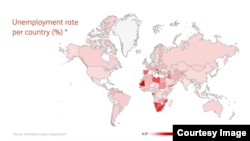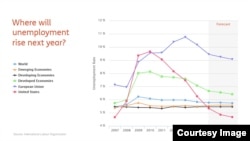A new report finds youth unemployment around the world is set to rise this year and many young people who do find jobs will be receiving a poverty-level wage.
The International Labor Organization, which released its World Employment and Social Outlook 2016 report Wednesday, said youth unemployment was expected to reach 13.1 percent in 2016 and remain at that level throughout 2017.
The ILO said the number of unemployed youths was expected to rise by 500,000 this year, bringing the total to 71 million. The increase, it said, was the first in three years.
Of even greater concern, the ILO said, is the large number of young people who live in extreme or moderate poverty despite having jobs. Most are in emerging or developing countries. It said that more than 156 million employed youths, or 37.7 percent of the total number of working youths, were living on less than $3.10 per day.
ILO senior economist Steven Tobin told VOA that the share of young workers living in poverty was above 70 percent in developing countries.
“The challenge within developing countries is very much a sub-Saharan African story," he said.
The report said working poverty rates among young people also were high in Arab states and South Asia. While the numbers are lower in developed countries, the study noted that young people in the more advanced economies were at higher risk of poverty than the elderly. Globally, the ILO said, unemployment is three times higher for youths than for adults.
Lawrence Johnson, deputy director of ILO research, said the wide disparities between young women and men in the global labor market were also disturbing. He said nearly 54 percent of young men were employed, compared with 37.3 percent of women.
“The gender gap in unemployment is particularly high in regions of the Arab states and North Africa,” he said, adding that the gap reflected the wider gender inequality that exists in society.
ILO economists said the alarming rise in youth unemployment and persistently high working poverty rates would make it very difficult to reach the global goal of ending poverty by 2030.






